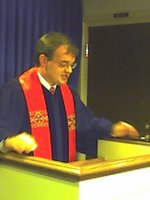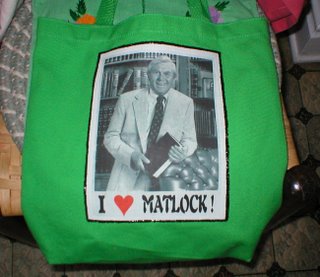A white knuckle preacher is one who is so nervous she cannot let go of the podium. A greed-wood preacher is one who is very inexperienced at the craft of preaching. As I stood before The Rev. Dr. Ellsworth Kalas to preach today, I was just about as worried as I have ever been. The two preachers before me had been moving and marvelous. Rev. Jim Martin (Western North Carolina Annual Conference) talked about how the music of our lives improves if we just let God play our strings. Rev. Alicia Coltzer (Texas Annual Conference) spoke about over coming our Jerichos.
Bishop Willimon reminds us often that preaching is a craft: we learn by doing. Whenever the Bishop says those words my mind is drawn to the craft of metal working, the boring of holes, the carving and polishing of die-cast cavities that Mark and Jeff and Chris and all my former co-workers
C&R Tool & Engineering showed me when I worked there in the summers of '94 and '95. I remember my father glueing together delicate peices on elaborate model rockets, knowing that a launch would risk its destruction. I remember the cuts and callouses and raw places upon my fingers as I learned to weave chairseats in the simple herringbone pattern -- only one of many styles of chair seat weaving. A craft is precious thing, a world of patience unequaled in the rush-rush, mass production of most modern life and industry. Preaching is in the same world as all these. We learn by doing.
Here's my sermon. The names have not been changed, but the last names have been removed except that of great friend of Becca and me ... Miss Kalea Chaplin.
======
Title: Which People? Which God?Scripture - Ruth 1:16-17 (KJV)(16) And Ruth said, “Intreat me not to leave thee, or to return from following after thee: for whither thou goest, I will go; and where thou lodgest, I will lodge: thy people shall be my people, and thy God my God: (17) Where thou diest, will I die, and there will I be buried: the LORD do so to me, and more also, if ought but death part thee and me.”
IntroductionThese ancient words are from the first chapter of the book of Ruth. Ruth’s husband has just died, along with his brother; and their father just before them. In the culture of the time, Ruth and her mother-in-law Naomi are now absolutely destitute. The only choice for Naomi is to return to her Hebrew relatives and glean a meager living. She tells her daughter-in-law Ruth to go back to her homeland of Moab. Naomi is worried about what her fellow Hebrews will do to Ruth since the Hebrews and Moabites did not get along too well. But Ruth boldly refuses with these famous words of loyalty to her mother-in-law: “whither thou goest, I will go; … thy people shall be my people, and thy God my God.”
This morning, I submit to you that every single person on this wayward planet desperately wants to say those very words: “thy people shall be my people and thy God my God.” Every single person, all of us want to say these words and will say those words. The only questions are: which people; which God? Let me share with you a story about a friend of mine who recently came face to face and bone to bone with this truth.
KaleaOn Saturday, July 15, our friend Kalea Chaplin and her family were on a day-trip to Nashville. Kalea is a youth from my last church. Now Kalea is thirteen – you can imagine what makes for a great day for a girl that age -- shopping. They spent the day at the Opryland Mills Mall. Kalea had the chance to shop and browse at all her favorite stores: Gap, Old Navy and even Saks Fifth Avenue. She did more browsing than buying at Saks; but they went there! They even ate dinner at a favorite restaurant. For Kalea life was full of joy, discovery, even security. At around 9:00 in the evening they left the last store, bags in hand, and food in bellies. Then the shots rang out.
Kalea and her family had just walked between two rival gangs. After the bullets flew the gang members scattered like cockroaches, many of them trampling Kalea. They left her bruised on the floor. Her mother rushed to her side. And she was alright, thanks be to God, but her sense of security, and safety and even innocence were trampled just as surely as she had been. She had been within just 2 or 3 feet of the shots. Kalea cried in her mother’s arms, “Why would anyone want to do this?”
What do we tell Kalea? Why would anyone want to come to a public place and indiscriminately open fire? It is not merely the question of a 13 year old girl. It is our question, isn't it? It is a question for the ages. Yet much of the answer is found in those bold words of Ruth: “thy people shall be my people, and thy God my God.” But which people? Which God?
Jason and LewisAs Kalea’s family passed the gangs and the bullets flew, according to the news reports, only two of the 15 or so gang members who were present were shot: a twenty-three-year-old named Jason and a 15-year-old named Lewis. Fortunately, Jason had only to stay overnight at Vanderbilt University Medical Center. Lewis had superficial wounds and the emergency room staff released him. I don’t know these two young men, but since they were in a gang we can know something about them. Let me tell you a story about Jason and Lewis.
Like all of us, Jason and Lewis have some kind of void in their life, a deep lack. We don’t know whether that lack is emotional or economic or something else, but Jason and Lewis find power, validation, belonging, connection, relationships, even friendship with their gang. It is that for which they starve.
Now think about Jason and Lewis. Jason is 23 years old. At 9:00 p.m. on a Saturday night he should have just finished college, been spending some of his first paycheck out for a night on the town with people his own age, and trying to catch the eye of the cute girl across the room. But he wasn’t. Now think about Lewis. At 9:00 p.m. on a Saturday night maybe he should have been at the same mall with his friends, trying desperately to think of something cool to say. But he wasn’t. Instead, they came face to face with weapons. These young men are so hungry for connection and validation and inspiration that they have no choice or challenge to turn to anything else but a gang. “ … [T]hy people shall be my people, and thy God my God …” But which people? Which God? And suppose the guns that shot Jason and Lewis had been aimed a little differently. Then another part of Ruth’s cry might have applied: “Where thou diest, will I die, and there will I be buried ….”
The PointThis may come as a shock to you all, but I am white. I have no first hand knowledge about gangs; I read; I research. And I remember. I remember in the halls of my high school, young men, trying to copycat the gang lifestyle, would wear Mercedez-Benz hood ornaments that they had stolen. Yet as I remember, I also wonder. Is there any difference between those young men and their hood ornaments, their demonstrations of ability at petty theft, is there any difference between them and Jason and Lewis? Let’s take it a step further. Is there any difference between Jason and Lewis and the monster homes which we construct in our more affluent neighborhoods, the energy we consume to make them fit our comfort, the bobbles we display to show our own greatness, that get us in the right club, the right circles, that get us into the right … dare we say it … gang. We all do it. “… [T]hy people shall be my people, and thy God my God ….” But what people? What God?
Kalea cried to her mother, “Why would anyone want to do this?” What do we tell Kalea? She did not just dodge a few bullets in a minor gang fight. She saw the fundamental human problem. And so do we. Gangmembers or not, Jason and Lewis are sons of the one true God. C. S. Lewis might say that Jason and Lewis were made from the beginning of creation to love and be loved. They would do anything to love and be loved. It is that for which they starve. It is that for which everyone starves. The scriptures tell us that God is love and God made us to love and be loved. But human beings can twist and sin God’s perfect dream into an oblivion of hate, shadow and hot lead. And the real crime is that some would still call that love. That is what sin can do; give the hated thing a blessed name.
Bill Hybels, the great pastor of Willow Creek Community Church in Chicago, recently said that fundamentally Christians, regardless of denomination, are a people with a message and not a product to sell. And he said that our message is simply this: Christ died for our sins to offer a place in eternity close to God. With all do respect to Bill Hybels, if one is only worried about the reality of heaven and hell, that’s only half the truth. We are indeed people of a message, yes: but our message is about world changing and life giving: changing this world and preparing for the next; witnessing to the life and love of God in Jesus Christ. Christ surely died for our sins to offer a place in eternity close to God should we chose to accept it, but Christ also lived then and lives even now to call us to craft the colony of the Kingdom of God on earth now so that every single human being may have a healthy community to which they can say “… thy people shall be my people, and thy God my God ….”
Right now every single human being, from the highest to the lowest, if they are close to God or far from God is made to love and be loved and looking to someone or some group to say those all important words: “ … thy people shall be my people, and thy God my God ….” The gang member says this. The hollow man with his manicured lawn says this. Even the odd seminary student is dying to say this; every single one of us. And they will say it to the darkest shadows of this world unless the church stands up, lives God’s dream and fulfills its destiny. We are called to live out a better way in Christ Jesus that we claim to know. We are called to witness to the hard and fast and healing truth that Jesus lived and died and lives again. This is the call, this is the hope of every professing Christian in this room. And to paraphrase Bill Hybels: fulfilling this destiny is worth the life of everyone in this room.
The Good NewsWhen I read the news reports of the shooting, I laughed at what the Opryland Mills Mall General Manager said, “We are committed to the safety and well-being of our shoppers and employees.” He has a responsibility to do that. It is great in its own way. But I could not get over how small a responsibility it is when we compare it to our responsibility. We’re not defending shoppers; we’re changing the world.
After I received news of the shooting, I found great hope that the Holy Spirit was running ahead of us, beginning this world changing for us: the hope was in a note that Kalea’s mom wrote me: “… [W]e all realize that we are so tremendously blessed that we were not in the line of fire during the shooting and we have been talking about how to turn this tragedy around.” How do we turn this tragedy around? We realize the truth that every single person that has lived, does live, or ever will live was made by God to love and be loved. Every single one of us have a hunger in our eyes that longs to turn to a healthy community of faith, rooted in the Triune God and shout at the top of our soul: “… thy people shall be my people and thy God my God ….”
Will we, the people of God, who claim to know the truth, who claim that this same truth has set us free, stand idly by and allow the sons and daughters of God to worship false gods that only want to bind, torture and kill our family? Or will a generation rally; stand for all those who are oppressed by this world, by sin, by wealth, by poverty or politics, and give to them the demanding and the buoyant love of Jesus Christ for which they have been longing, for which they were made? Should we not just proclaim the good news, but be the Good News?
Which people? Which God? We are the people; and He is the God – none other. Amen.
======
Here are some of the reviews of the sermon:
1. Facinating connection between street gangs and middle class America - held together well
2. Good pace of speaking
3. "The Dog Swallowed the Tail" -- that is the sermon created a narrative unity.
4. Could have put the shooting story in the beginning for more effect.
5. Good graphic images -- "cockroaches" -- proclaim the Good News v. BE the Good News.
6. Biblical introdcution needed to be stretched out; it was too hurried. There could have been a better connection between the God we choose and who we are or become, more Biblical paralells could have been drawn there and strengthened the sermon.
7. Christian, Evangelical, Social Gospel -- very Wesleyan
8. Sermon came from your gut.
One of the great blessings in being in this program is that there are no "bad" preachers here. Everyone is top notch, especially the teacher. And all of that skill is focused on helping each other preach more effectively. The greatest blessings that God ever gave me are my excellent wife, my excellent parents, and my call to preach the Gospel; but this Beeson Program and the professional development here that is possible, really ranks right up there. So blessed be the name of the Lord! I only pray that I will have the courage to say this should I go through rough and terrible times, for even then, His name will be worthy of blessing.
Grace and peace,
Trav Wilson











